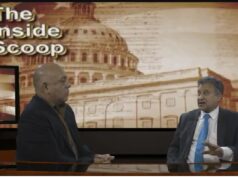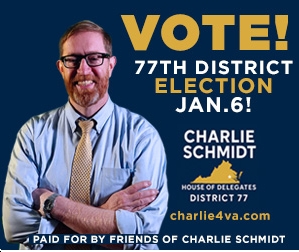
We’re seeing real changes in what citizens think about the dishonest redistricting amendment, which wouldn’t end partisan gerrymandering but would enshrine bipartisan gerrymandering in our Constitution. What will happen in the future if the referendum passes is exactly what happened with the current state Senate lines: both parties’ incumbents will cut a deal to protect themselves.
The Virginia NAACP, the local parties, and the Democratic Party of Virginia are all opposed to this. A number of people, including Delegates Levine and Bagby, Lowell, Cindy, Linda Perriello, and Paul Goldman, all deserve credit for educating people about the insidiousness of these amendments. The newspapers endorsed it without reading the language closely and without comparing it to the referendum. Now the editorial boards are reading it, and they may well come around. Is it enough?
I caught up with Mr. Goldman for a quick reality check on the referendum. Think what you want of him – I happen to like the guy – but nobody can question his political insight.
Jeff Thomas: Thanks for your time, Paul. Reality check – where are we on the referendum? What else can people do?
Paul Goldman: I have no doubt we could defeat it if we were all voting on Election Day. But people are already voting.
If the Democratic Party really wants to defeat this thing, we need to bring out bigger guns, and the biggest gun we have is Senator Warner. He’s on the ballot as a sure winner, he appeals to a broad section of people, he’s got a twenty point lead that’s real and durable. If he doesn’t come out against it publicly, then I don’t think we can defeat the constitutional amendments.
Mark Warner and I go way back. I wrote his gubernatorial campaign platform and he succeeded me as Democratic Party Chair. He’s a smart guy. If there was a business that was making the claims that the referendum proponents are making, Mark Warner may well be in court arguing that it was consumer fraud. Mark Warner has a vote – and he has to choose whether to vote for, against, or abstain. The Constitution requires a majority of all votes to pass, so an abstention counts the same as a no vote. It’s certainly not going to hurt him politically to come out against this thing. If he doesn’t come out, then a lot of people will be misled into voting for something they don’t want.
Mark Warner is the only person who can get a front page story on this in every paper. Given his statewide credibility, Mark Warner’s opposition would be vital to preventing voters from being misled.
JT: What should people’s messaging be?
PG: You have to have more public opposition with credible arguments. It can’t just be that we can do better – you have to tell people that they’re not being told the facts. This is about the integrity of the system: the referendum is destructive to the system. We all understand what happens when Trump upsets the integrity of the system, but what about Democrats? If you want equal justice, you can’t have bromides, it has to actually work.
If you respect the vote, you have to actually respect it. The right to vote is the right to an informed vote – you can’t take it away, manipulate it, devalue it. Nobody is denying that the referendum is flawed – in fact, it’s fatally flawed. We can’t allow a fatally flawed, fake referendum to take place: it’s too dangerous to democracy and the right to vote. What do you want citizens to think? That they can’t trust anything on the ballot?
We’re supposed to rely on our legislature to provide us an accurate summary of the amendments. That hasn’t happened. A lot of us worked very hard to get people the right to vote, but as the Court warned in Reynolds v. Sims, there are ways to effectively take away people’s right to vote but still let them “vote” just for show. We hear the argument all the time, “we have to save the people’s right to vote” – and you look around at what the General Assembly is doing, and they’re doing exactly the opposite. It’s like something out of Saturday Night Live.
Defeating the referendum still allows you to do true nonpartisan redistricting by statute. But if you put this morass in the Constitution, it becomes impossible to get out. The fact that some legislators voted for something that sounded good but didn’t understand isn’t a good excuse for putting it into the Constitution.
JT: It sounds like we’re almost out of time.
PG: We’re down to the practical now. It’s not about philosophy anymore. We need Mark Warner to come out against it. The more the leaders of our state remain silent, the more they assent.
***
The ballot question and the actual constitutional changes are below. This is the first time in Virginia history where we have a referendum that leaves out an entire constitutional amendment. One 89-word ballot question covers two amendments that total about 1,400 words – exactly is the kind of stunt the Byrd Machine used to pull.
Ballot question: full text (one question, 89 words)
Should the Constitution of Virginia be amended to establish a redistricting commission, consisting of eight members of the General Assembly and eight citizens of the Commonwealth, that is responsible for drawing the congressional and state legislative districts that will be subsequently voted on, but not changed by, the General Assembly and enacted without the Governor’s involvement and to give the responsibility of drawing districts to the Supreme Court of Virginia if the redistricting commission fails to draw districts or the General Assembly fails to enact districts by certain deadlines?
Actual constitutional changes: full text (two Amendments, 1,400 words)
(underlined words are new, strikethroughs are deletions)
Section 6. Apportionment.
Members of the House of Representatives of the United States and members of the Senate and of the House of Delegates of the General Assembly shall be elected from electoral districts established by the General Assembly pursuant to Section 6-A of this Constitution. Every electoral district shall be composed of contiguous and compact territory and shall be so constituted as to give, as nearly as is practicable, representation in proportion to the population of the district. Every electoral district shall be drawn in accordance with the requirements of federal and state laws that address racial and ethnic fairness, including the Equal Protection Clause of the Fourteenth Amendment to the Constitution of the United States and provisions of the Voting Rights Act of 1965, as amended, and judicial decisions interpreting such laws. Districts shall provide, where practicable, opportunities for racial and ethnic communities to elect candidates of their choice.
The General Assembly shall reapportion the Commonwealth shall be reapportioned into electoral districts in accordance with this section and Section 6-A in the year 2011 2021 and every ten years thereafter.
Any such decennial reapportionment law shall take effect immediately and not be subject to the limitations contained in Article IV, Section 13, of this Constitution.
The districts delineated in the decennial reapportionment law shall be implemented for the November general election for the United States House of Representatives, Senate, or House of Delegates, respectively, that is held immediately prior to the expiration of the term being served in the year that the reapportionment law is required to be enacted. A member in office at the time that a decennial redistricting law is enacted shall complete his term of office and shall continue to represent the district from which he was elected for the duration of such term of office so long as he does not move his residence from the district from which he was elected. Any vacancy occurring during such term shall be filled from the same district that elected the member whose vacancy is being filled.
Section 6-A. Virginia Redistricting Commission.
(a) In the year 2020 and every ten years thereafter, the Virginia Redistricting Commission (the Commission) shall be convened for the purpose of establishing districts for the United States House of Representatives and for the Senate and the House of Delegates of the General Assembly pursuant to Article II, Section 6 of this Constitution.
(b) The Commission shall consist of sixteen commissioners who shall be selected in accordance with the provisions of this subsection.
(1) Eight commissioners shall be legislative members, four of whom shall be members of the Senate of Virginia and four of whom shall be members of the House of Delegates. These commissioners shall be appointed no later than December 1 of the year ending in zero and shall continue to serve until their successors are appointed.
(A) Two commissioners shall represent the political party having the highest number of members in the Senate of Virginia and shall be appointed by the President pro tempore of the Senate of Virginia.
(B) Two commissioners shall represent the political party having the next highest number of members in the Senate of Virginia and shall be appointed by the leader of that political party.
(C) Two commissioners shall represent the political party having the highest number of members in the House of Delegates and shall be appointed by the Speaker of the House of Delegates.
(D) Two commissioners shall represent the political party having the next highest number of members in the House of Delegates and shall be appointed by the leader of that political party.
(2) Eight commissioners shall be citizen members who shall be selected in accordance with the provisions of this subdivision and in the manner determined by the General Assembly by general law.
(A) There shall be a Redistricting Commission Selection Committee (the Committee) consisting of five retired judges of the circuit courts of Virginia. By November 15 of the year ending in zero, the Chief Justice of the Supreme Court of Virginia shall certify to the Speaker of the House of Delegates, the leader in the House of Delegates of the political party having the next highest number of members in the House of Delegates, the President pro tempore of the Senate of Virginia, and the leader in the Senate of Virginia of the political party having the next highest number of members in the Senate a list of retired judges of the circuit courts of Virginia who are willing to serve on the Committee, and these members shall each select a judge from the list. The four judges selected to serve on the Committee shall select, by a majority vote, a judge from the list prescribed herein to serve as the fifth member of the Committee and to serve as the chairman of the Committee.
(B) By January 1 of the year ending in one, the Speaker of the House of Delegates, the leader in the House of Delegates of the political party having the next highest number of members in the House of Delegates, the President pro tempore of the Senate of Virginia, and the leader in the Senate of the political party having the next highest number of members in the Senate shall each submit to the Committee a list of at least sixteen citizen candidates for service on the Commission. Such citizen candidates shall meet the criteria established by the General Assembly by general law.
The Committee shall select, by a majority vote, two citizen members from each list submitted. No member or employee of the Congress of the United States or of the General Assembly shall be eligible to serve as a citizen member.
(c) By February 1 of the year ending in one, the Commission shall hold a public meeting at which it shall select a chairman from its membership. The chairman shall be a citizen member and shall be responsible for coordinating the work of the Commission.
(d) The Commission shall submit to the General Assembly plans for districts for the Senate and the House of Delegates of the General Assembly no later than 45 days following the receipt of census data and shall submit to the General Assembly plans for districts for the United States House of Representatives no later than 60 days following the receipt of census data or by the first day of July of that year, whichever occurs later.
(1) To be submitted as a proposed plan for districts for members of the United States House of Representatives, a plan shall receive affirmative votes of at least six of the eight legislative members and six of the eight citizen members.
(2) To be submitted as a proposed plan for districts for members of the Senate, a plan shall receive affirmative votes of at least six of the eight legislative members, including at least three of the four legislative members who are members of the Senate, and at least six of the eight citizen members.
(3) To be submitted as a proposed plan for districts for members of the House of Delegates, a plan shall receive affirmative votes of at least six of the eight legislative members, including at least three of the four legislative members who are members of the House of Delegates, and at least six of the eight citizen members.
(e) Plans for districts for the Senate and the House of Delegates shall be embodied in and voted on as a single bill. The vote on any bill embodying a plan for districts shall be taken in accordance with the provisions of Article IV, Section 11 of this Constitution, except that no amendments shall be permitted. Such bills shall not be subject to the provisions contained in Article V, Section 6 of this Constitution.
(f) Within fifteen days of receipt of a plan for districts, the General Assembly shall take a vote on the bill embodying that plan in accordance with the provisions of subsection (e). If the General Assembly fails to adopt such bill by this deadline, the Commission shall submit a new plan for districts to the General Assembly within fourteen days of the General Assembly’s failure to adopt the bill. The General Assembly shall take a vote on the bill embodying such plan within seven days of receipt of the plan. If the General Assembly fails to adopt such bill by this deadline, the districts shall be established by the Supreme Court of Virginia.
(g) If the Commission fails to submit a plan for districts by the deadline set forth in subsection (d), the Commission shall have fourteen days following its initial failure to submit a plan to the General Assembly. If the Commission fails to submit a plan for districts to the General Assembly by this deadline, the districts shall be established by the Supreme Court of Virginia.
If the Commission submits a plan for districts within fourteen days following its initial failure to submit a plan, the General Assembly shall take a vote on the bill embodying such plan within seven days of its receipt. If the General Assembly fails to adopt such bill by this deadline, the districts shall be established by the Supreme Court of Virginia.
(h) All meetings of the Commission shall be open to the public. Prior to proposing any redistricting plans and prior to voting on redistricting plans, the Commission shall hold at least three public hearings in different parts of the Commonwealth to receive and consider comments from the public.
(i) All records and documents of the Commission, or any individual or group performing delegated functions of or advising the Commission, related to the Commission’s work, including internal communications and communications from outside parties, shall be considered public information.














